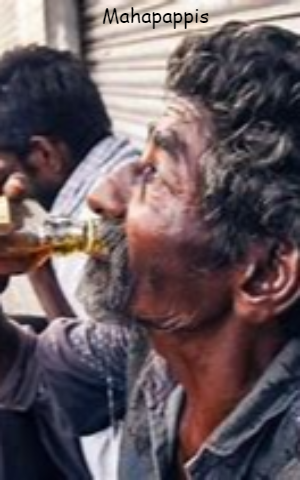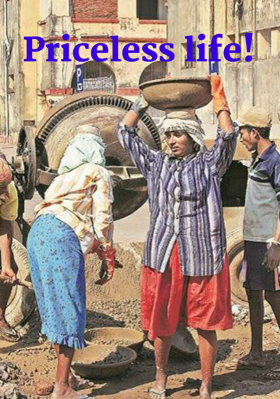Mahapappis
Mahapappis


“Those who drink are not Indians but mahapappis” thundered the senior political leader and seven- time chief minister of a now perpetually backward state to the media. What provoked such outrage was the death on account of hooch tragedy in the state where liquor manufacturing and sale is prohibited. To add further he even quoted Mahatma and stated that drinking was considered to be a sin. Surprisingly following the teachings of Mahatma and gender consideration he had enforced prohibition in the state in the bargain losing a huge revenue source for the state’s coffer. He very well knew about states like Punjab, Kerala, Tamilnadu, Maharashtra where the liquor flowed and the states got a huge revenue in the form of tax. Incidentally these states scored high on human-development index making him often wonder if liquor consumption had anything to do with faster development of human-beings.
If one were to turn the pages of history, one would wonder with awe about the Magadh empire founded by Mauryas, often considered to be the golden period in Indian history. The world-famous Nalanda university was too founded in this state and flourished till it was plundered by the infidels who invaded the ancient nation. The Chanakya, shrewd guru of politics and governance was also born here. Cut to the present the state was languishing at the bottom of human development and citizens were referred to with derogation as “Biharis.” What happened in the interim was worthy of a doctorate and a magnum opus of a historical novel beyond the capacity of this writer. Now the state has become famous for migration of labour. The locals not able to sustain on agriculture alone and unable to find employment migrated to other part of India.
Kishan first came in to Gurgaon a decade ago. Prior to that he worked in Kolkatta as a daily wager. He read about Gurgaon and demand for labourers in the real estate sector and boarded a train and persevered the long train journey in the unreserved class. He found Gurgaon to be a heaven on earth. He found employment, shelter and decent wages unthinkable in his home state. Soon enough Kishan found alcohol to be an escape from his loneliness, body pain borne out of hard physical labor. Part of his wages went for daily tipple at the end of the day without which sleep eluded him. Like him many youth from the cow belts were there eking out a living in Gurgaon. Shelter was space just enough to roll out a thin mattress. Toilet and bathing were done in conditions fit for cattle class as one erudite politician referred to those who travelled in economy class in flights. Most of the days were spent outside this shelter. Work was a gruelling 9-10 hrs after which there was just time enough for a tipple, down some dinner, totter your way back home to the shelter and crash for the night. On an occasional holiday Kishan would get together with some acquaintances to watch some raunchy film and jerk himself off.
So, it was inevitable Kishan and scores like him eagerly look forward to their annual holidays when they would head home to their villages in the erstwhile region where Magad empire once stood. Kishan not only sent home money on a monthly basis and would take home some goodies for the family with the bonus he got from the employer a few days prior to the holidays. His village was a non-descript place not worth living but his elderly parents with his other brother and wife eked out a living there doing some monsoonal cultivation, dairying and managing with some money remitted by Kishan. Mahatma also talked about village swaraj, a concept for self-sufficient villages and village industries, left undone by the politicians in the post independent era. Bihar completely missed the boat as it could not untether itself from the feudal and casteist politics and society. In fact it represented India’s medieval society for what it was.
Kishan was happy to be back home. For a change he got to eat food cooked by his mother. He loved litti-chokka which she would serve him only with ghee topping. In the evening his craving for alcohol started and he had a sleepless night. Next day he set out to meet his old friend and asked if some could be arranged for a tipple. His friend took Kishan to an old man’s field. The old man was smoking a beedi and he was known for his country liquor in his hey days. He barely managed to get two square meals these days. His eyes lit up when Kishan’s friend broached the subject of liquor. He knew there was prohibition and had almost forgotten his trade. But he was hungry and greedy. It was since long he had some chicken curry and didn’t want to miss the opportunity. He took some advance from Kishan and asked them to assemble by night by the ravine bed on the periphery of the village. He would during the day procure things for the preparation.
The old man cycled up to the nearby town and spent a few hours getting the necessary things for the country liquor. It one were to delve deep into making of the country liquor one would realise it is commonly made from molasses and distilled. During fermentation the maker would add urea, oxytoxin, besramble leaves. But the fermentation has to be controlled by keeping the temperature below a certain point . If un-controlled the resultant brew would become methyl alcohol instead of the intended ethyl alcohol and would result in death.
In the evening when the sun was down when Kishan and a few friends reached the ravine with some food and snacks the old man was almost finishing the process. The liquor was cooling in a container and smelt reasonably good. Kishan’s friend remarked that the old man had not lost his touch. Least they knew that the old man had indeed lost his touch. The temperature exceeded the limit and the liquor had turned out to be methyl alcohol.
Kishan was hit first. Long years of drinking had onset liver cirrhosis in Kishan, the signs which Kishan continued to dismiss. It started with a head splitting ache, dizziness, abdominal pain, vomiting and heart beat became irregular. Kishan convulsed in pain and literally saw stars in the sky. He thought he saw a lightning streak and the lord of death Yama appeared atop a male buffalo. Kishan heard Yama telling his assistant that long years of drinking made Kishan a candidate to be welcomed aboard the gates of hell. Kishan tried to plead for a second chance but his voice would not come. He dreamily saw his friend and others too writhing in pain. The old man had already died.
In the night when Kishan’s father realised that Kishan was yet to return, he gathered a few villagers and set out in search. When they came to the ravine bed they were shocked at the sight and Kishan’s father fell down in a dizzy.
Next day the police and the media came. That evening the seven times CM came and paid cursory homage to the victims. He was terribly angry when he made the statement that drinkers were mahapappis. There was a social media uproar and he had to retract the statement later. A week later everybody had forgotten about yet another hooch tragedy. Some people dismissed the incident as that one’s karma. The opposition criticized the government and when they went out of the state didn’t forget to have a drink or two. The local sub-inspector was shifted and the local papers reported in a cursory manner as a punishment transfer.
The ex-state of Magadh continued as business as usual.





























































